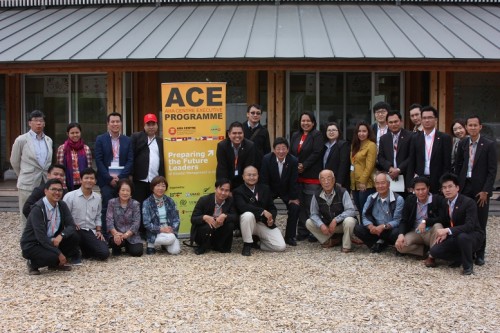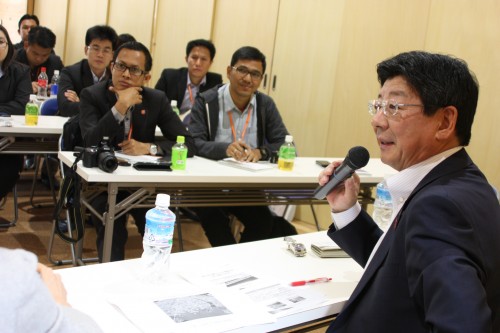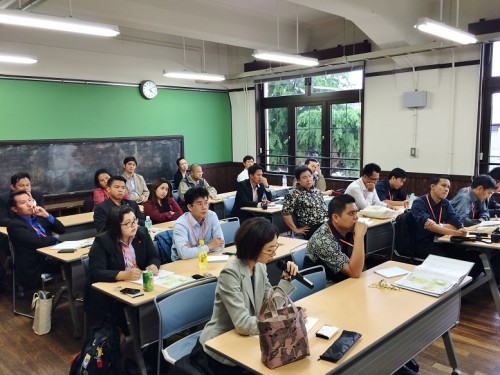AHA Centre Japan Study Tour: For the leaders in disaster management in ASEAN
2015.05.25
Sharing Japan’s experience with ASEAN countries
For 1 week from May 11th, regional organization Asia Pacific Alliance for Disaster Management (A-PAD) received 16 participants from 8 ASEAN countries who were seconded to the ASEAN Coordinating Centre for Humanitarian Assistance (AHA Centre) located in Jakarta, Indonesia.
The Japan Study Tour was a part of the 6-month long AHA Centre Executive Programme (ACE Programme) which is a training program for national disaster management officers from each ASEAN country. In this program, the aim is to build the participants’ capacity and knowledge on disaster management for the purpose of professional development and to be active in ASEAN as disaster management leaders. This is the second year that A-PAD has organized the Japan Study Tour.
In the first half of the Study Tour, the participants visited disaster affected areas in Northeastern Japan such as the town of Minami Sanriku which was severely devastated after 3.11, Tohoku University’s International Research Institute of Disaster Science (IRIDeS) which leads the world in advanced research on natural disasters, and the Miyagi Prefecture Reconstruction Bureau among others. In the second half of the Tour, they visited the affected areas of the Great Hanshin-Awaji Earthquake to learn the local initiatives and observe the present state of government-led reconstruction efforts.
?Highlighting collaboration between the government, businesses and NGOs
On May 11, a reception for the 16 trainees and 2 AHA Centre staff members was held and attended by Ministry of Foreign Affairs’?Non-Governmental Organizations Cooperation Division Chief Mr. Norio Ehara and Japan Platform Executive Director Mr. Nobuhisa Iida who both gave words of encouragement to the trainees. Mr. Ehara emphasized the collaboration between the government, businesses and NGOs by saying “When a disaster strikes, one important point is cooperation with NGOs. For this purpose, all of your cooperation is necessary.”
The cruelty of natural disasters
4 hours away from Tokyo. After a bullet train raid and bus transfer, the group arrived at Minami-sanriku town where construction work on the coast is booming. They visited a temporarily built shopping district and a middle school that, while located on top of a 15-meter high hill, still encountered the destruction of the tsunami.
Here, volunteer guide Kazuma Goto (68 years old) relayed the moment the tsunami hit the area: “The tsunami in 3.11 was beyond the reach of imagination. There are things you cannot prevent from a disaster. What is most important is to run away.”Moreover, Yasuo Katusukura (82 years old) shared his experience from the 3.11 tsunami and the 1960 tsunami of the Chile earthquake while telling the story of Minami Sanriku as it was before the disasters. “I was born and raised in Minami Sanriku. I want to show everyone the town that has recovered as soon as possible. I would like you to bring home what you have learned here and utilize it in your countries.”
Minami Sanriku Mayor Jin Sato also conducted an open forum with the participants where he explained his government’s initiatives since the disaster. “More than 4 years since the disaster even now there are many who still live in temporary housing. There’s still some way to go until reconstruction. In order for a disaster not to occur a second time we have decided to relocate to higher ground and are advancing construction work. ?However, when the living environment changes, the community is also destroyed. Such is the cruelty of disasters.”
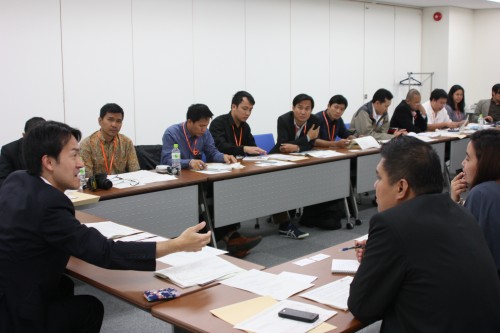
In Northeast Japan, they also visited Tohoku University’s International Research Institute of Disaster Science (IRIDeS) and the Miyagi Prefecture Reconstruction Bureau where research experts and government officials actively exchanged opinions about the DRR efforts in ASEAN countries and? the programs of the Japanese government and NGOS from the 3.11 disasters until now.
From Northeast Japan the group continued on to Kobe in Western Japan, which marked the 20th anniversary since the Great Hanshin-Awaji earthquake.
Cooperation leads to better assistance
On the 14th of May in Kobe, the trainees listened to lectures by Mr. Seiichi Sakurai, advisor on regional issues at the Ministry of Internal Affairs and Communication (MIC), CEO of the NGO Collaboration Center for Hanshin Earthquake Rehabilitation Mr. Masakiyo Murai, and Hyogo Research Center for Quake Restoration Executive Director Mr. Toshikazu Deguchi about the roles of the government and NGOs after the earthquake.
Of these, with the theme “Livelihood Recovery Support Framework for Individual Disaster Victims”, Mr. Sakurai explained collaboration with private groups and the importance of earthquake-resistant design. He emphasized the significance of cooperating with other sectors and said “ After the earthquake, many relief goods arrived from all over the country but a lot of them were a mix of food and clothing. Municipal workers worked through the night to sort the goods but due to the volume they abandoned the work after 3 days. At that time, a logistics company helped us and effective sorting was carried out. I experienced first-hand how cooperation with various experts and organizations leads to better assistance.”
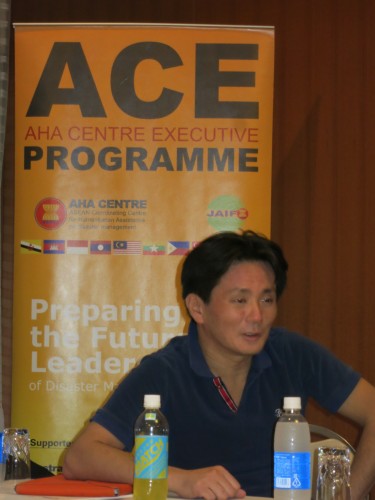
The important thing is preparation on a regular basis
In the afternoon, the group moved to Tokushima prefecture, home to Otsuka Group, where they visited the company’s facilities such as the Otsuka Pharmaceuticals Human Resource Development Center, and the Otsuka Foods Tokushima Factory to observe the production lines of beverage products Oronamin C and MATCH. Rounding out the Japan Study Tour is a Leaders Talk Session during which Mr. Taro Otsuka, chairperson of Otsuka Warehouse Co., Ltd. introduced the Otsuka Group and talked about leadership.
Mr. Otsuka explained “It’s difficult to predict where, when, and what disaster will take place. The most important thing is preparation on a regular basis. In Japan, companies and organizations in various fields such as pharmaceuticals, food and beverage, and logistics recommend to think about emergency measures on a daily basis. Moreover, the trainees asked about the responsibility of a leader to which Mr. Otsuka answered “For every crisis or irregular event that occurs, one must not run away. However, a leader by himself cannot do anything. It’s important to think about putting the right people in the right jobs.
For the mother land
One of the trainees, Mr. Theophilus Yanuarto from Indonesia, looked back on this Study Tour. “Visiting the actual locations in Kobe and Tohoku that experienced disasters, I was able to learn a lot about disaster management in Japan. Indonesia experienced a tsunami in 2004, but the government’s response after that was insufficient. I hope to utilize what I have learned in Japan for the sake of my country,” he enthusiastically said.
********************
A-PAD will continue to contribute to building the capacity of Asian countries as it deepends collaboration with ASEAN and other agencies.





